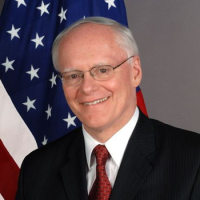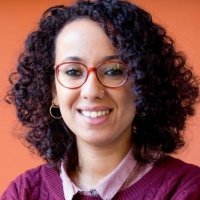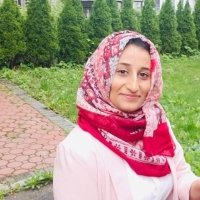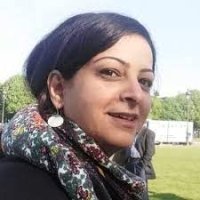Women of the Revolution: A Vision for Post-war Yemen
On March 31, the Middle East Program hosted a panel discussion with some of the brightest stars in Yemeni diasporic society to discuss the future of Yemen after its current conflict. These women participated in Yemen’s revolution and have since risen to prominence in advocacy organizations, academia, and journalism. Each has been a vocal advocate for change in Yemen and has been on the forefront of considering possibilities for the country’s political future that go beyond the short-term solutions to the current conflict. Rather than seeing through the eyes of foreign pundits or Yemeni men commenting on events at home from abroad, this panel presented the perspectives of Yemen’s women who are the defenders and peacemakers of their homeland.
Afrah Nasser, Yemen Researcher at Human Rights Watch, argued that Yemen’s political landscape has been flawed for years, contributing to the disempowerment of Yemeni women and the present civil war. "In the National Dialogue, women fought really hard because they got a glimpse of an international political will to empower them, but it wasn't a national political will. There were so many flaws in how the National Dialogue was organized and conducted, and one of the outcomes of that failure was the civil war."
Summer Nasser, Founder and CEO of Yemen Aid, emphasized that international NGOs are a necessity in the effort to combat Yemen’s humanitarian crisis, but cannot be relied upon as a long-term solution. “The INGOs have played a somewhat positive role on the ground, but the risks outweigh the benefits when it comes to the approach right now.” Furthermore, impunity among organizations that claim to accept aid only complicate the situation, as “there will be no peace in Yemen without accountability.”
Wameedh Shakir, a humanitarian worker in Yemen, called for an increase in women representation and leadership in political parties. “Women should be empowered to participate in political, economic, and cultural processes.” Furthermore, “There is equal importance to have women in political parties as well as women in civil society.”
Gender Issues
Many problems faced by Yemen today are a consequence of the rampant disempowerment of women in a range of fields. During the National Dialogue negotiations in 2013, women advocated to have their rights recognized in political negotiations. However, they were frequently told, “this was not the right time for women to be at the same negotiating table,” according to Afrah.
Yemeni women are systematically under-represented in the political and civil society spheres. Afrah confessed that “just being a woman, very often, feels like a crime,” highlighting a lack of feminist men in Yemeni political parties and society.
Each of the panelists agreed that a greater role for women in Yemeni political, social, and economic organizations would be crucial for an effective long-term peace. Women have been increasingly active outside the home during the war, and “NGOs have opened opportunities for local women,” according to Wameedh Shakir. Meanwhile, men have often lost their salaries and turned to assisting women in the workforce, demonstrating that a more egalitarian Yemen is already being created.
International Aid and Donor Dependency
While international aid is critical to curbing “the largest humanitarian crisis in the world,” it presents a number of complicated factors for Yemen’s future and long-term peace. Asher Orkaby, MEP Fellow and Yemen expert, stated, “There are a sizable number of Yemeni refugees who don’t have a home or receive recognition.” Without the ability to migrate easily into nearby Gulf countries such as Saudi Arabia or Oman, refugees are forced to flee through more treacherous paths. Further, Afrah put forth, “There seems to be a hierarchy of what refugees deserve in rights, and Yemenis are at the bottom,” claiming that Yemeni refugees do not receive the same attention as Syrian refugees.
International aid that does make its way through Yemen’s borders is not delivered accountably, frequently stolen by the Houthis or other groups. The fiscal and material resources serve to entrench donor dependency, detracting attention from national and local economic systems. In the long run, this can diminish the efforts of Yemen’s civil society organizations. Orkaby added, “this was the breadbasket of the Southern Arabian Peninsula, and by having a real donor dependency on foreign aid, it would be negative for the future of Yemen’s agricultural community.”
U.S. Policy
Consumed by their relationship with Saudi Arabia and intent on combatting Iranian influence, U.S. policy towards Yemen is designed to serve its regional geostrategic goals. As Summer Nasser stated, “The US should focus on Yemen for Yemen and not for Saudi Arabia.”
The panel advocated for a Yemeni-led and female-led process towards peace in Yemen. “If we as Yemenis don’t make the U.S. administration understand their interests in a comprehensive policy towards Yemen, there will not be a change,” Afrah argued. Beyond that, whether in political, economic, or cultural processes, it is crucial that women are empowered to participate and create a Yemeni future that is equitable and just for all of its citizens.
Speakers
Introduction

Former ambassador to Iraq and Turkey, and Special Envoy to the Global Coalition To Defeat ISIS
Moderator

Hosted By

Middle East Program
The Wilson Center’s Middle East Program serves as a crucial resource for the policymaking community and beyond, providing analyses and research that helps inform US foreign policymaking, stimulates public debate, and expands knowledge about issues in the wider Middle East and North Africa (MENA) region. Read more



